 How Do You Know If You Are Making a Difference?
How Do You Know If You Are Making a Difference? Book contents
- Frontmatter
- Dedication
- Contents
- List of figures and tables
- Acknowledgements
- Preface
- 1 Why is it so hard to know if you are making a difference?
- 2 Why complexity thinking can help you understand public services
- 3 What data and evidence do you need to see what difference you are making?
- 4 Embrace the complex contex
- 5 Embrace the complex context
- 6 Clarify the change you want to see
- 7 Get going on your data, evidence and feedback improvement journey
- 8 Tracking progress towards outcomes and impacts
- 9 Telling the story of the difference your work makes
- 10 Using this approach in different contexts and sectors
- 11 Becoming an outcome- and impact-focused organisation
- References
- Index
5 - Embrace the complex context
Published online by Cambridge University Press: 20 June 2023
- Frontmatter
- Dedication
- Contents
- List of figures and tables
- Acknowledgements
- Preface
- 1 Why is it so hard to know if you are making a difference?
- 2 Why complexity thinking can help you understand public services
- 3 What data and evidence do you need to see what difference you are making?
- 4 Embrace the complex contex
- 5 Embrace the complex context
- 6 Clarify the change you want to see
- 7 Get going on your data, evidence and feedback improvement journey
- 8 Tracking progress towards outcomes and impacts
- 9 Telling the story of the difference your work makes
- 10 Using this approach in different contexts and sectors
- 11 Becoming an outcome- and impact-focused organisation
- References
- Index
Summary
So much of what differentiates a good organisation from a great one is the ability to understand and work well with the context.
Whether supporting people to move on in their lives, implementing new policy initiatives, providing training or spreading good practice, the evidence shows that the most effective approaches are those that are tailored to the specific context in which the work is done (Cook, 2015). This is something we see in practice every day in our work with organisations, and something that is at the core of understanding the difference they make.
Previous chapters have already outlined how working in complex systems means there are many dynamic and moving parts, and that outcomes or impacts can be unexpected and unpredictable. We discussed in Chapter 2 how the very specific context – the time, place, people, culture, institution and setting – make a huge difference to how things are done and what difference they make. The unpredictability of the COVID-19 pandemic is one example of how context cuts across the delivery of projects, programmes and policies. It’s easy to think of other examples at different scales, such as staff recruitment, local or national policy decisions, buildings and infrastructure, and even the weather, that influence the progress of any initiatives.
In our work, we support people to deliberately embrace the complex context for their work. Rather than ignoring it, trying to work well with the challenges and opportunities of any initiative’s context can help improve delivery and really make a difference to people and communities. It’s also essential for shaping how the initiative will make a difference, and for tracking that difference.
This chapter:
• discusses why context matters;
• sets out a practical framework to help understand context;
• explains why it is important to link context and outcomes with risks and assumptions.
We hope this chapter will help you realise the benefits of embracing the complex context for the work you do and give you some practical tools to help work with this complexity despite the challenges it presents. These practical tools are illustrated with a case study and with examples throughout the chapter.
- Type
- Chapter
- Information
- How Do You Know If You Are Making a Difference?A Practical Handbook for Public Service Organisations, pp. 60 - 75Publisher: Bristol University PressPrint publication year: 2022


